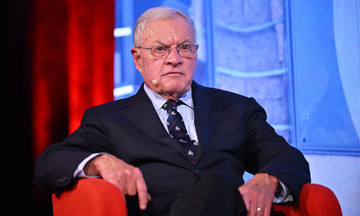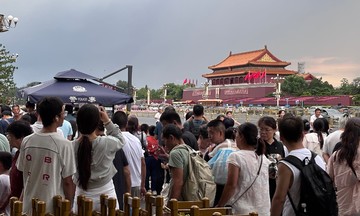Two weeks after Elon Musk parted ways with President Trump, Sam Altman, CEO of OpenAI, the company behind ChatGPT, entered the dining room of the president's New Jersey golf club with a smile. The 40-year-old Altman, a significant rival of Musk, had just finished a private meeting with the president and was about to have dinner with top donors. Amid applause, President Trump introduced Altman to the club members as "an incredibly talented individual."
"I hope he's right about AI," the president said.
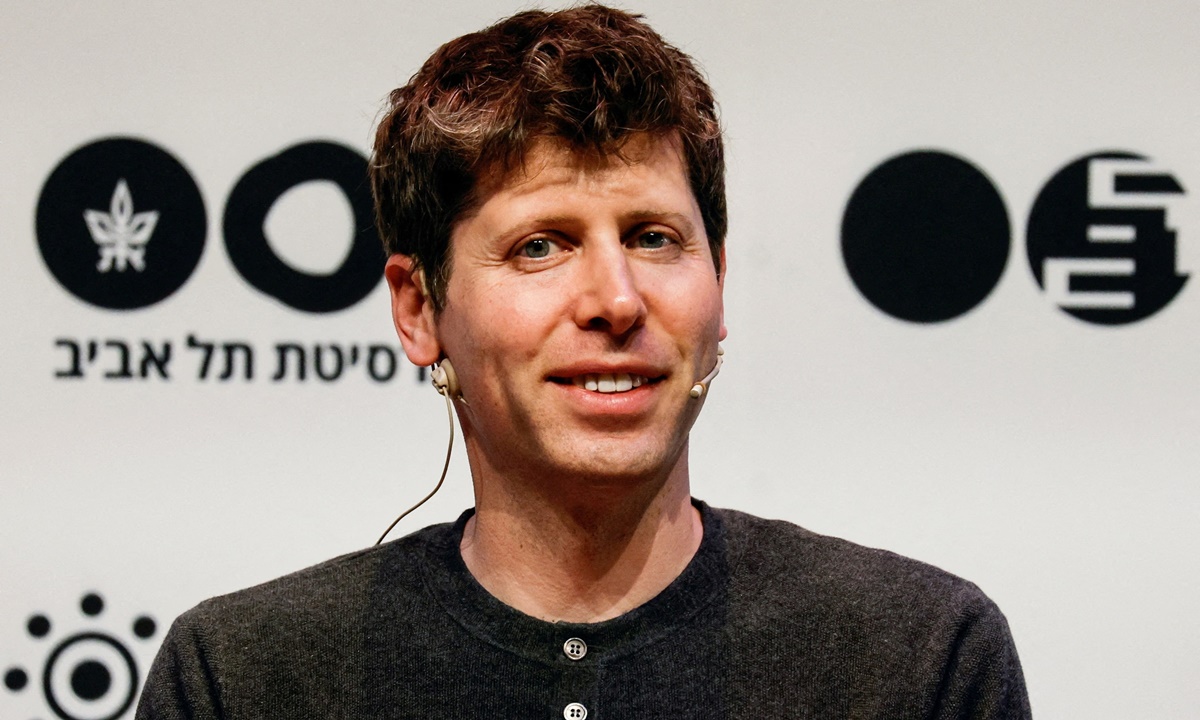 |
Sam Altman, CEO of OpenAI and creator of ChatGPT, speaks at Tel Aviv University, Israel, in 6/2023. Photo: Reuters |
Sam Altman, CEO of OpenAI and creator of ChatGPT, speaks at Tel Aviv University, Israel, in 6/2023. Photo: Reuters
This warm June meeting was a stark contrast to the cold shoulder Altman received in the initial weeks following Trump's election. Altman distanced himself from Musk, OpenAI's co-founder who had left the company. Musk's close relationship with President Trump prevented Altman from attending meetings at Mar-a-Lago. During Trump's inauguration at Capitol Hill, Altman was relegated to a side room while other tech CEOs occupied prominent seats.
Despite these setbacks, Altman persisted in his efforts to connect with the president. He patiently waited for an opportunity, quietly maneuvering around Musk. He pursued AI infrastructure deals that aligned with President Trump's agenda and steered clear of his former friend, who was suing OpenAI for allegedly betraying its mission. Altman cultivated a relationship with the president, dining with him at Mar-a-Lago in 3/2024 and occasionally speaking by phone. A longtime Democrat who had criticized Trump, Altman now expressed regret to associates for his harsh words.
On 4/7, Altman announced on X that he was no longer a Democrat, claiming the party had shifted too far left, leaving him "politically homeless". This coincided with a favorable moment for Altman to shift his political stance. Musk's abrupt departure from President Trump's inner circle created an opening for Altman to gain government support for his efforts to build substantial AI infrastructure globally and influence AI regulations. Further demonstrating Altman's growing influence, he became a keynote speaker at a Federal Reserve conference in late July, addressing banking leaders on AI's economic impact.
"President Trump has big plans for AI in America and building the infrastructure needed for us to lead," an OpenAI spokesperson said. "We look forward to continuing to work with him to grow the economy and ensure AI benefits everyone".
Altman's transformation into President Trump's AI advisor is surprising to many. He had primarily donated to Democrats, reflecting the progressive values of the tech world. Altman supported Hillary Clinton in 2016 because "Donald Trump represented an unprecedented threat to America," he wrote on his blog at the time, warning that a Trump presidency would be "disastrous for the American economy". Earlier that summer, Altman wrote another post, conceding that "Trump is right about some big things," like the economy. However, he disagreed with the Republican candidate's proposed solutions. "For anyone familiar with the history of Germany in the 1930s, watching Trump is terrifying," Altman wrote.
Simultaneously, Altman grew concerned about the Democrats' economic policies. As the Biden administration prepared its Covid-19 stimulus package, he warned that this influx of money would cause inflation and increase the national debt. Despite this, Altman remained a loyal Democrat, donating 200,000 USD to Biden's 2023 re-election campaign. Over time, Altman became disillusioned with the Biden administration's AI policy. He considered the CHIPS and Science Act, designed to bring chip manufacturing back to America, insufficient, with only 50 billion USD allocated for semiconductor development and production.
The Biden administration's restrictions on chip exports to countries accessible by US rivals, such as China, hampered Altman's years-long pursuit of building AI infrastructure in the Middle East and attracting investment from the region.
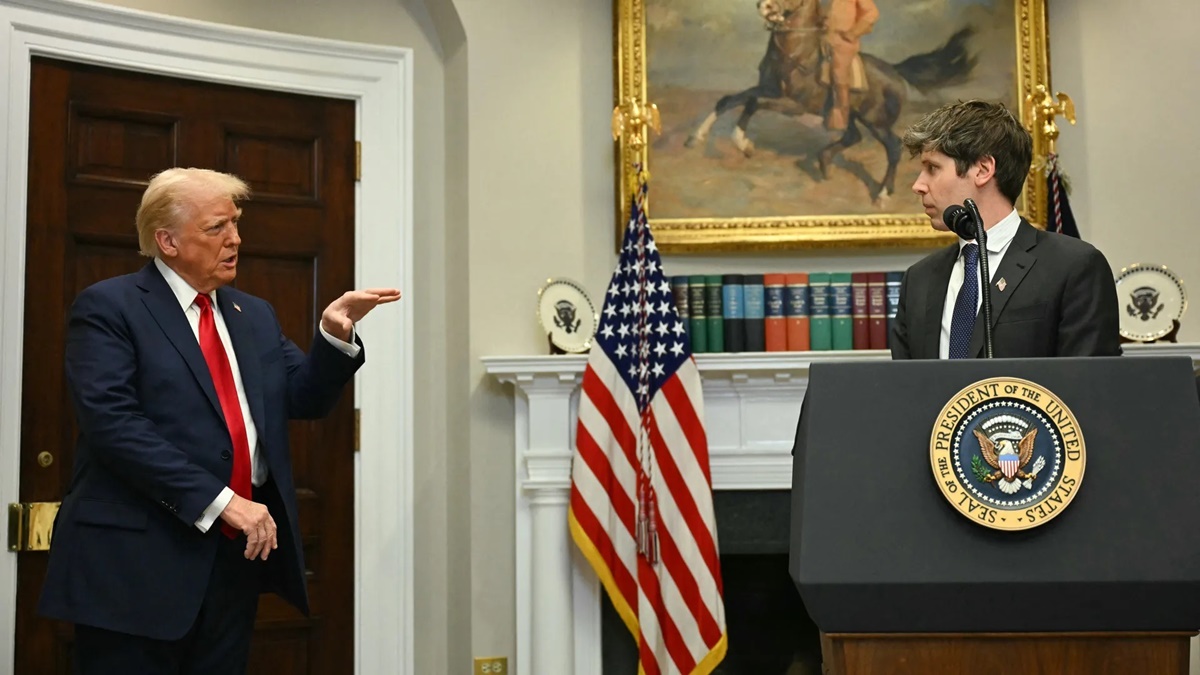 |
President Trump (left) and Altman at the White House on 21/1. Photo: AFP |
President Trump (left) and Altman at the White House on 21/1. Photo: AFP
In the spring of 2024, Altman began courting Trump as part of a bipartisan outreach effort. Understanding Trump's affinity for winners, OpenAI positioned itself as the leader in AI, then impressed him with its technology. By 6/2024, OpenAI executives met with Trump at a Las Vegas hotel and demonstrated Sora, their text-to-video tool, which hadn't yet launched but later shook Hollywood. They argued for government investment in AI infrastructure and the removal of regulations hindering the AI industry's growth, emphasizing the need to outpace China. Days later, Trump declared on a podcast that America needed to "leapfrog China" in AI.
"We need more power than we've ever had before to grow AI at the highest level," he emphasized. By the Republican National Convention in July, the need for AI infrastructure had become a key part of his platform. A week later, Altman echoed this sentiment in a Washington Post op-ed, asserting that "infrastructure is key" in the AI race between the US and China or Russia.
With Trump's victory, Altman seemingly had a willing partner for his goals, if not for Musk. Musk was suing Altman and competing with OpenAI through his own company, xAI. He was also President Trump's biggest donor and rarely left his side. So, while other tech CEOs could easily fly to Mar-a-Lago to meet with Trump after the election, Altman had to work through intermediaries.
Recognizing the need for outside help, OpenAI hired Jeff Miller, an influential lobbyist and fundraiser in the MAGA movement, and Chris LaCivita, Trump's 2024 campaign advisor. Both introduced Altman to people close to the president. Altman also received help from Larry Ellison, Oracle's co-founder, who had known Trump for years and was about to expand his partnership with OpenAI. Altman donated one million USD to the president's inauguration, securing him a ticket, though not a prime seat.
The next day, he surprised Musk by standing in the Oval Office with the president to announce a 500 billion USD partnership between OpenAI, Oracle, and Japan's SoftBank to build data centers for training and running AI models. Upon learning the details, Musk attacked the deal on X, claiming SoftBank lacked the funds. Altman declared Musk entirely wrong. Musk resurfaced an old tweet of Altman's praising venture capitalist Reid Hoffman for preventing Trump's re-election in 2020.
The feud escalated to the point where the president intervened. "He hates somebody in the deal," Trump said when asked by reporters if Musk's criticism bothered him. "Everybody in the deal is very, very smart, but there's one person that Elon happens to hate. I don't happen to like certain people either". The message seemed clear: the president wouldn't let Musk's criticism hinder his collaboration with Altman.
After his inauguration, President Trump immediately implemented policies promoting the infrastructure development OpenAI had advocated, including a "Unleash American Energy" executive order signed on his first day to expedite permitting for power projects. When OpenAI hosted an AI conference in Washington on 30/1, Interior Secretary Doug Burgum attended, and Kellyanne Conway, a former senior advisor to Trump in his first term who remained close to the White House, sat in the front row. In 3/2024, Altman attended a dinner Trump hosted for donors at Mar-a-Lago. Each attendee contributed one million USD to his super PAC.
By May, OpenAI and the Trump administration were ready to announce the next step in their partnership with Oracle and SoftBank: a data center in Abu Dhabi. This was made possible by the Trump administration lifting chip export restrictions imposed under former President Biden. The deal involved building a massive 5-gigawatt data center complex in Abu Dhabi, UAE, to train and run AI models, in partnership with local tech company G42.
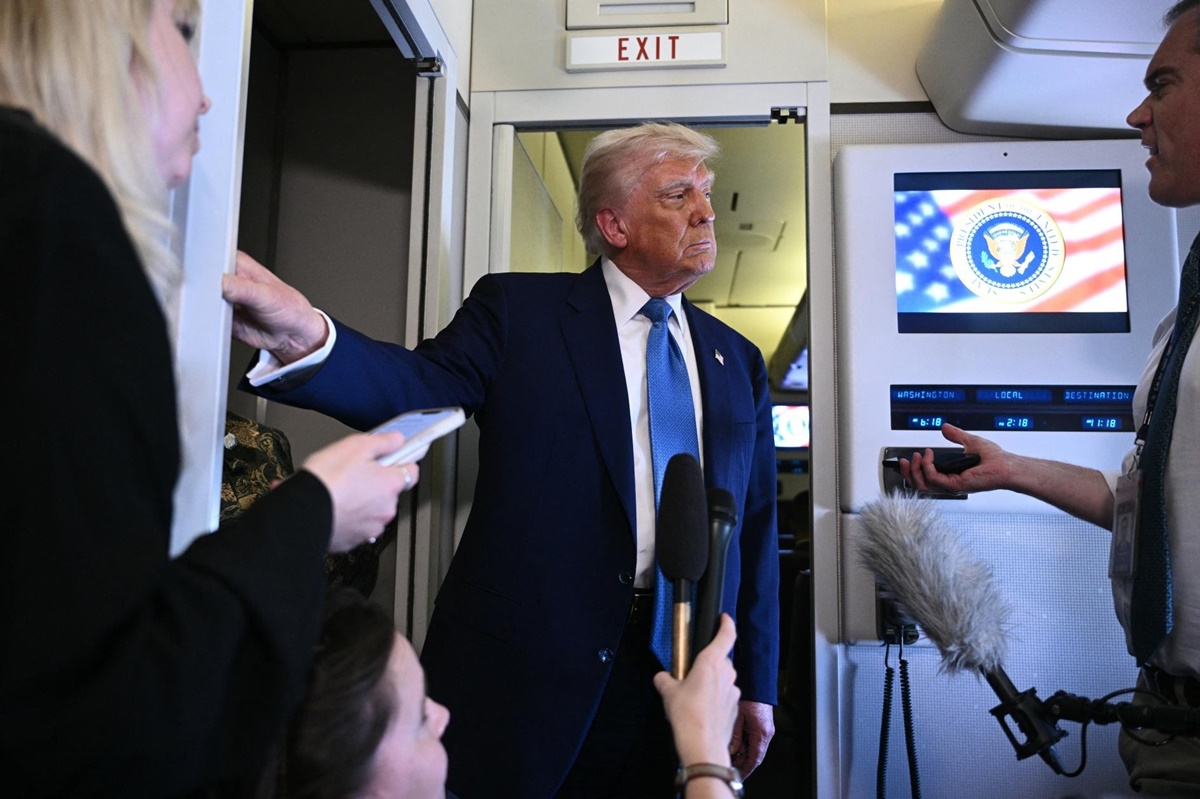 |
Trump speaks to reporters aboard Air Force One after leaving Abu Dhabi in 5/2024. Photo: AFP |
Trump speaks to reporters aboard Air Force One after leaving Abu Dhabi in 5/2024. Photo: AFP
Musk had previously cultivated a relationship with Tahnoun bin Zayed, who controlled G42, and his MGX fund invested in both xAI and OpenAI. On 14/5, reporters traveling with the president were informed that Trump and OpenAI would announce the Abu Dhabi data center plan the following day. When Musk learned Altman was on the Middle East trip and would stand alongside the president and G42 leadership for the announcement, he repeatedly complained to presidential aides and his contacts at G42. The situation became so tense that President Trump had to leave a meeting to address it.
G42, concerned about Musk's backlash, postponed the announcement. Reporters were asked not to publish the story. To appease Musk, the White House agreed that no US government officials would be present at the announcement, and the information would only be released after Trump's Middle East trip concluded. The deal was announced a week later with less fanfare than initially planned.
This incident alarmed some senior White House staff. Shortly after news broke on 28/5 about Musk's efforts to thwart the deal, he announced his departure from the White House and began publicly criticizing President Trump's "Beautiful Act," then still a bill. Just a week after the Abu Dhabi deal, Musk's relationship with President Trump dissolved.
Meanwhile, Altman continued strengthening his ties with the administration. On 16/6, OpenAI announced a 200 million USD contract with the Pentagon. The Trump administration is expected to announce its AI action plan later this month. OpenAI has lobbied for the plan to include measures facilitating AI infrastructure development. According to US media, the White House is considering granting federal land to tech companies for building data centers to train AI models.
"I believe in technological capitalism," Altman recently posted on X, explaining his decision to leave the Democratic Party. He envisioned a world where people become wealthier through science, technology, and education, helping America maintain its global advantage. "I believed this when I was 20, 30, and now at 40, I still do," he stated. "The Democratic Party seemed pretty aligned with that when I was 20, lost its way when I was 30, and has now completely veered off in another direction".
Altman doesn't identify as a Republican but has told people he might vote Republican in the next election.
Vu Hoang (According to WSJ, AFP, Reuters)



